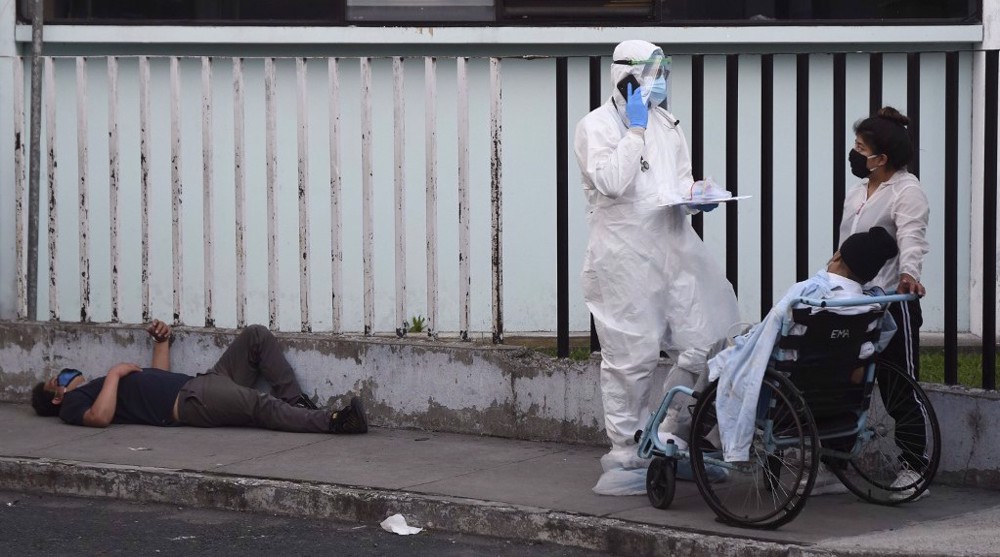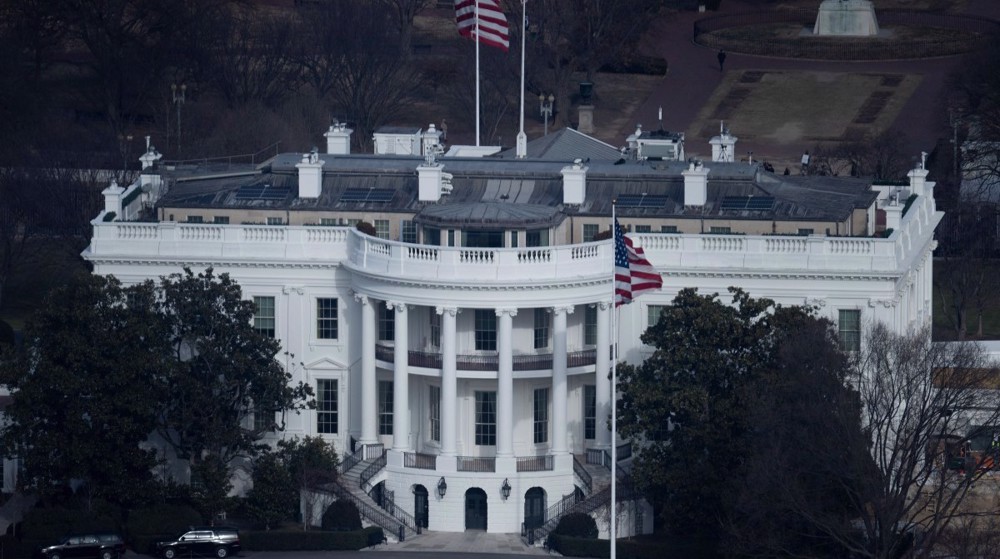Global COVID-19 cases pass 7.13mn mark, death toll at 406,540
The total coronavirus infections worldwide now number at 7,136,366, and the toll of related deaths has reached 406,902, according to the latest data compiled by Johns Hopkins University.
The data shows that as of Tuesday morning, the United States continues to lead all other nations in both the number of confirmed COVID-19 cases and death toll, which stand at 1,961,185 and 111,007 respectively.
Brazil trails the US with the world’s second-highest number of infections at 707,412, followed by Russia’s 416,043 reported cases.
Britain follows the US in the number of coronavirus fatalities, with 40,680 deaths. Brazil holds on to the third-largest fatality rate, now standing at the 37,134 mark as the Latin American nation continues to struggle to contain the fast-spreading epidemic.
The following are the latest updates on how the outbreak has impacted the globe:
Britain marks lowest COVID-19 deaths since March
The United Kingdom’s death toll from confirmed infections climbed by only 55 on Monday to 40,597, marking the lowest rise of fatalities since a lockdown was imposed by Prime Minister Boris Johnson back in March, according to official government figures released on Monday.
A broader measure of the British death toll from the disease, which includes suspected cases, indicates that the country’s fatalities are likely to be above 50,000, according to official data sources tallied by Reuters.
That makes the United Kingdom the second worst-hit country in the world in terms of the number of deaths resulting from the disease, after the United States.
The country’s Health Secretary of State for Health and Social Care Matt Hancock, meanwhile, launched a study on Tuesday to find out the prevalence and spread of the coronavirus among school children and teachers in England in a bid to help inform the phased reintroduction of education after a lengthy national lockdown.
However, the decision to gradually re-open schools has divided opinion, with ministers warning of the need for caution to prevent a second wave of the epidemic.
Russia partially reopens borders, Moscow lifts lockdown
Moscow’s Mayor Sergei Sobyanin announced the lifting of the city’s months-long coronavirus lockdown on Monday, saying that the pandemic was under control, making it possible to resume normal life during the course of June.
Sobyanin’s remarks came shortly after Russia declared a partial reopening of its borders, saying it would allow people who needed to work, study, get medical treatment, or look after relatives to travel abroad for the first time since late March.
“The pandemic has slowly but steadily been on the wane for several weeks,” Sobyanin wrote on his personal blog. “Moscow can practically get back to its usual rhythm of life.”
Russia, meanwhile, continues to report thousands of new infections daily. Its nationwide tally surpassed the 476,000 mark — being the third-highest in the world — though the number of cases in Moscow has fallen by more than half to nearly 2,000 per day.
However, the total number of deaths across the large country stands at only 5,971 — much lower than many other countries.

France reports higher deaths, lower new infections
France’s coronavirus fatalities reflected a four-fold rise on Monday compared to the previous day, though the increase of new confirmed cases of COVID-19 stood at a one-week low.
The French Health Ministry announced in a statement that the country’s death toll had climbed by 54 to 29,209 — the fifth-highest total in the world on Sunday. Only 13 COVID-19 deaths were reported.
The figure could further surge on Tuesday, the day now chosen by the government to add, once a week, data from nursing homes, which account for more than a third of the total deaths.
The number of confirmed cases in the country increased by 0.1 percent to 154,188, which is lower than the rolling seven-day average of 0.2 percent. France’s total number of cases now stands at nearly 191,00 — the ninth-highest in the world.

Mexico reports 3,000 new infections
Mexico reported 2,999 new coronavirus cases on Monday, taking the total number of cases in the country to more than 120,000, according to Health Ministry data.
The country’s official death toll from the disease climbed to 14,053, up from 13,699 the previous day.
The government has further announced that the actual number of infections and deaths caused by the contagion is likely to be significantly higher than the currently confirmed cases.
Brazil reports 679 new deaths amid controversy over data
Brazil reported 679 new COVID-19 deaths as well as 15,654 additional infections on Monday, as a controversy over the country’s official data continued to persist.
The development came after Brazil’s Health Ministry removed data from its website over the weekend and halted releasing cumulative totals for coronavirus fatalities and infections following its publication of two conflicting sets of data.
In a statement on Monday, the health ministry said its weekend dataset problems stemmed from errors in the numbers from two states that were later corrected, though discrepancies in the daily death toll it reported triggered criticism from across the political spectrum, including a call for a parliamentary probe.

Venezuela gets COVID-19 aid from Iran
Venezuela’s government announced on Monday that a flight carrying humanitarian aid for the epidemic had arrived from Iran, amid the brutal sanctions imposed on the Central American country by the US aimed at forcing President Nicolas Maduro from power.
“Right now, what we are receiving is different types of testing kits,” Planning Minister Ricardo Menendez said on state television, standing on a runway at the country’s Maiquetia airport near boxes piled on pallets.
“Today, we are seeing the arrival of these materials to strengthen Venezuela in its fight against the coronavirus,” said Iran’s Ambassador to Caracas Hojjatollah Soltani.
Health experts say Venezuela faces a high risk from the pandemic due to a broad economic collapse that has severely weakened public hospitals and undermined public services, including electricity and running water.
Dispute sparks in India over hospital beds
Indian federal authorities rejected an order by the Delhi city government on Monday to reserve hospital beds for local residents as the world’s second-most populous country reported a record number of coronavirus infections in a single day.
Delhi Chief Minister Arvind Kejriwal had said the city would soon run out of beds if COVID-19 patients kept coming from across India to its hospitals, drawing criticism that he was being unethical.
The densely-populated cities of Delhi and Mumbai remain the hotspots for coronavirus infections in India, which climbed to 256,611 nationwide as of Monday, according to the Health Ministry, which also said that the death toll from the disease stood at 7,135.
Delhi lieutenant governor Anil Baijal, who represents the federal government, said denying treatment merely because someone was not a resident of the capital would be legally impermissible.
Delhi has also stopped hotels from reopening as it might want to convert them into temporary hospitals if there is a major jump in new cases.
This is while health experts insist that India’s peak could still be weeks, if not months, away.

Pakistan cracks down on safety breaches as infections top 100,000
Authorities in Pakistan have intensified the enforcement of government safety measures after a rise in the daily number of coronavirus cases pushed total infections to over 100,000.
Official figures on Monday showed 103,671 total cases and 2,067 deaths from the contagion so far.
Record numbers of new infections over the past 10 days are partly due to increased testing.
The development came after Islamabad lifted its nationwide lockdown last month, putting protocols in place for the reopening of markets, industries, and public transport — including mandatory wearing of masks and social distancing.
However, Pakistan’s Planning Minister Asad Umar, who is in charge of the national response to the pandemic, said during a weekend press conference that many markets and shops had been sealed because of non-compliance over the last few days.
Of the 23,000 daily tests, more than 1 in 5 have been positive over the last 10 days. Before the lockdown was lifted on May 9, according to official data, the number of tests finding the coronavirus was nearly 1 in 10.

Saudi Arabia may limit Hajj pilgrimage amid pandemic fears
Saudi Arabia, meanwhile, could significantly limit the number of Muslims taking part at the annual Hajj pilgrimage later this year to prevent a further outbreak of the coronavirus disease after cases in the Persian Gulf kingdom surpassed the 100,000 mark, according to sources cited in a Reuters report on Monday.
Nearly 2.5 million pilgrims visit Islam’s holiest sites in the Saudi cities of Mecca and Medina for the Hajj rituals, a once-in-a-lifetime obligation for every Muslim that is financially and physically capable of performing it.
The report said Saudi authorities had called on Muslims in March to put Hajj plans on hold and suspended the non-compulsory Umrah pilgrimage until further notice.
Some Saudi officials are still pushing for a cancellation of the Hajj event, expected to start in late July, the report added, citing its sources.
The kingdom halted international passenger flights in March, and on Friday re-imposed a curfew in Jeddah, where Hajj flights land, following a surge in infections in the city.
Qatar to lift lockdown in four phases from June 15
Qatar will begin lifting COVID-19 restrictions under a four-phase plan starting on June 15, when some mosques can reopen and flights can take off, government spokeswoman Lulwa Rashed al-Khater declared during a Monday press briefing.
Khater said the next three phases would start on July 1, August 1, and September 1, respectively.
She further said that the restrictions could still be re-imposed or the stages delayed if necessary.
The second phase, according to al-Khater, will allow a partial opening of restaurants and the third will permit the resumption of flights from low-risk countries and the reopening of shopping malls and markets with limited capacity.
Qatar reported 1,368 new coronavirus cases and three deaths on Monday, bringing the totals to 70,158 cases and 57 deaths.
It has the second-highest number of cases after Saudi Arabia in the six countries of the Persian Gulf Cooperation Council, which have recorded 279,662 cases of infection and 1,455 deaths.
US-Israeli strike targets IRIB facility; broadcasts continue
IRGC: Latest waves of Op. True Promise 4 led to tanker strikes, base shutdowns, heavy casualties
CENTCOM confirms US troops killed in Iran’s retaliatory strikes
China ‘strongly condemns’ US-Israeli assassination of Iran’s Leader
Iran sees no limits in defending itself after Leader's ‘dangerous’ assassination: FM
IRGC strikes USS Abraham Lincoln aircraft carrier with volley of ballistic missiles
Iranian armed forces to pulverize US bases across the region: Pezeshkian
Enemy will take dream of enslaving the Iranian nation to grave: Army chief










 This makes it easy to access the Press TV website
This makes it easy to access the Press TV website